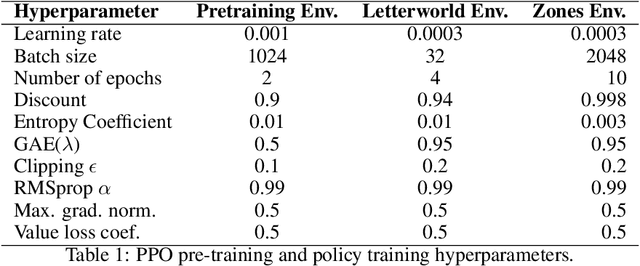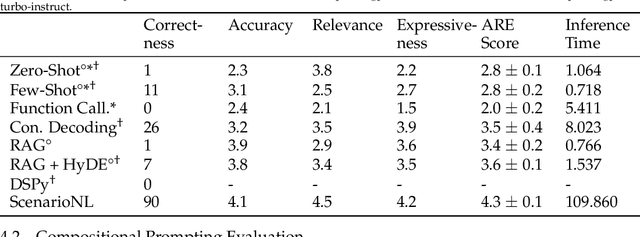Sanjit A. Seshia
EECS, UC Berkeley
Learning Contextual Runtime Monitors for Safe AI-Based Autonomy
Jan 28, 2026Abstract:We introduce a novel framework for learning context-aware runtime monitors for AI-based control ensembles. Machine-learning (ML) controllers are increasingly deployed in (autonomous) cyber-physical systems because of their ability to solve complex decision-making tasks. However, their accuracy can degrade sharply in unfamiliar environments, creating significant safety concerns. Traditional ensemble methods aim to improve robustness by averaging or voting across multiple controllers, yet this often dilutes the specialized strengths that individual controllers exhibit in different operating contexts. We argue that, rather than blending controller outputs, a monitoring framework should identify and exploit these contextual strengths. In this paper, we reformulate the design of safe AI-based control ensembles as a contextual monitoring problem. A monitor continuously observes the system's context and selects the controller best suited to the current conditions. To achieve this, we cast monitor learning as a contextual learning task and draw on techniques from contextual multi-armed bandits. Our approach comes with two key benefits: (1) theoretical safety guarantees during controller selection, and (2) improved utilization of controller diversity. We validate our framework in two simulated autonomous driving scenarios, demonstrating significant improvements in both safety and performance compared to non-contextual baselines.
Robust and Diverse Multi-Agent Learning via Rational Policy Gradient
Nov 12, 2025Abstract:Adversarial optimization algorithms that explicitly search for flaws in agents' policies have been successfully applied to finding robust and diverse policies in multi-agent settings. However, the success of adversarial optimization has been largely limited to zero-sum settings because its naive application in cooperative settings leads to a critical failure mode: agents are irrationally incentivized to self-sabotage, blocking the completion of tasks and halting further learning. To address this, we introduce Rationality-preserving Policy Optimization (RPO), a formalism for adversarial optimization that avoids self-sabotage by ensuring agents remain rational--that is, their policies are optimal with respect to some possible partner policy. To solve RPO, we develop Rational Policy Gradient (RPG), which trains agents to maximize their own reward in a modified version of the original game in which we use opponent shaping techniques to optimize the adversarial objective. RPG enables us to extend a variety of existing adversarial optimization algorithms that, no longer subject to the limitations of self-sabotage, can find adversarial examples, improve robustness and adaptability, and learn diverse policies. We empirically validate that our approach achieves strong performance in several popular cooperative and general-sum environments. Our project page can be found at https://rational-policy-gradient.github.io.
MRTA-Sim: A Modular Simulator for Multi-Robot Allocation, Planning, and Control in Open-World Environments
Apr 21, 2025



Abstract:This paper introduces MRTA-Sim, a Python/ROS2/Gazebo simulator for testing approaches to Multi-Robot Task Allocation (MRTA) problems on simulated robots in complex, indoor environments. Grid-based approaches to MRTA problems can be too restrictive for use in complex, dynamic environments such in warehouses, department stores, hospitals, etc. However, approaches that operate in free-space often operate at a layer of abstraction above the control and planning layers of a robot and make an assumption on approximate travel time between points of interest in the system. These abstractions can neglect the impact of the tight space and multi-agent interactions on the quality of the solution. Therefore, MRTA solutions should be tested with the navigation stacks of the robots in mind, taking into account robot planning, conflict avoidance between robots, and human interaction and avoidance. This tool connects the allocation output of MRTA solvers to individual robot planning using the NAV2 stack and local, centralized multi-robot deconfliction using Control Barrier Function-Quadrtic Programs (CBF-QPs), creating a platform closer to real-world operation for more comprehensive testing of these approaches. The simulation architecture is modular so that users can swap out methods at different levels of the stack. We show the use of our system with a Satisfiability Modulo Theories (SMT)-based approach to dynamic MRTA on a fleet of indoor delivery robots.
Provably Correct Automata Embeddings for Optimal Automata-Conditioned Reinforcement Learning
Mar 06, 2025Abstract:Automata-conditioned reinforcement learning (RL) has given promising results for learning multi-task policies capable of performing temporally extended objectives given at runtime, done by pretraining and freezing automata embeddings prior to training the downstream policy. However, no theoretical guarantees were given. This work provides a theoretical framework for the automata-conditioned RL problem and shows that it is probably approximately correct learnable. We then present a technique for learning provably correct automata embeddings, guaranteeing optimal multi-task policy learning. Our experimental evaluation confirms these theoretical results.
Learning Symbolic Task Decompositions for Multi-Agent Teams
Feb 19, 2025Abstract:One approach for improving sample efficiency in cooperative multi-agent learning is to decompose overall tasks into sub-tasks that can be assigned to individual agents. We study this problem in the context of reward machines: symbolic tasks that can be formally decomposed into sub-tasks. In order to handle settings without a priori knowledge of the environment, we introduce a framework that can learn the optimal decomposition from model-free interactions with the environment. Our method uses a task-conditioned architecture to simultaneously learn an optimal decomposition and the corresponding agents' policies for each sub-task. In doing so, we remove the need for a human to manually design the optimal decomposition while maintaining the sample-efficiency benefits of improved credit assignment. We provide experimental results in several deep reinforcement learning settings, demonstrating the efficacy of our approach. Our results indicate that our approach succeeds even in environments with codependent agent dynamics, enabling synchronous multi-agent learning not achievable in previous works.
Syzygy: Dual Code-Test C to (safe) Rust Translation using LLMs and Dynamic Analysis
Dec 18, 2024Abstract:Despite extensive usage in high-performance, low-level systems programming applications, C is susceptible to vulnerabilities due to manual memory management and unsafe pointer operations. Rust, a modern systems programming language, offers a compelling alternative. Its unique ownership model and type system ensure memory safety without sacrificing performance. In this paper, we present Syzygy, an automated approach to translate C to safe Rust. Our technique uses a synergistic combination of LLM-driven code and test translation guided by dynamic-analysis-generated execution information. This paired translation runs incrementally in a loop over the program in dependency order of the code elements while maintaining per-step correctness. Our approach exposes novel insights on combining the strengths of LLMs and dynamic analysis in the context of scaling and combining code generation with testing. We apply our approach to successfully translate Zopfli, a high-performance compression library with ~3000 lines of code and 98 functions. We validate the translation by testing equivalence with the source C program on a set of inputs. To our knowledge, this is the largest automated and test-validated C to safe Rust code translation achieved so far.
Compositional Automata Embeddings for Goal-Conditioned Reinforcement Learning
Oct 31, 2024



Abstract:Goal-conditioned reinforcement learning is a powerful way to control an AI agent's behavior at runtime. That said, popular goal representations, e.g., target states or natural language, are either limited to Markovian tasks or rely on ambiguous task semantics. We propose representing temporal goals using compositions of deterministic finite automata (cDFAs) and use cDFAs to guide RL agents. cDFAs balance the need for formal temporal semantics with ease of interpretation: if one can understand a flow chart, one can understand a cDFA. On the other hand, cDFAs form a countably infinite concept class with Boolean semantics, and subtle changes to the automaton can result in very different tasks, making them difficult to condition agent behavior on. To address this, we observe that all paths through a DFA correspond to a series of reach-avoid tasks and propose pre-training graph neural network embeddings on "reach-avoid derived" DFAs. Through empirical evaluation, we demonstrate that the proposed pre-training method enables zero-shot generalization to various cDFA task classes and accelerated policy specialization without the myopic suboptimality of hierarchical methods.
SimpleStrat: Diversifying Language Model Generation with Stratification
Oct 11, 2024



Abstract:Generating diverse responses from large language models (LLMs) is crucial for applications such as planning/search and synthetic data generation, where diversity provides distinct answers across generations. Prior approaches rely on increasing temperature to increase diversity. However, contrary to popular belief, we show not only does this approach produce lower quality individual generations as temperature increases, but it depends on model's next-token probabilities being similar to the true distribution of answers. We propose \method{}, an alternative approach that uses the language model itself to partition the space into strata. At inference, a random stratum is selected and a sample drawn from within the strata. To measure diversity, we introduce CoverageQA, a dataset of underspecified questions with multiple equally plausible answers, and assess diversity by measuring KL Divergence between the output distribution and uniform distribution over valid ground truth answers. As computing probability per response/solution for proprietary models is infeasible, we measure recall on ground truth solutions. Our evaluation show using SimpleStrat achieves higher recall by 0.05 compared to GPT-4o and 0.36 average reduction in KL Divergence compared to Llama 3.
Synthetic Programming Elicitation and Repair for Text-to-Code in Very Low-Resource Programming Languages
Jun 05, 2024Abstract:Recent advances in large language models (LLMs) for code applications have demonstrated remarkable zero-shot fluency and instruction following on challenging code related tasks ranging from test case generation to self-repair. Unsurprisingly, however, models struggle to compose syntactically valid programs in programming languages unrepresented in pre-training, referred to as very low-resource Programming Languages (VLPLs). VLPLs appear in crucial settings including domain-specific languages for internal to tools and tool-chains and legacy languages. Inspired by an HCI technique called natural program elicitation, we propose designing an intermediate language that LLMs ``naturally'' know how to use and which can be automatically compiled to the target VLPL. Specifically, we introduce synthetic programming elicitation and compilation (SPEAK), an approach that enables LLMs to generate syntactically valid code even for VLPLs. We empirically evaluate the performance of SPEAK in a case study and find that, compared to existing retrieval and fine-tuning baselines, SPEAK produces syntactically correct programs more frequently without sacrificing semantic correctness.
Generating Probabilistic Scenario Programs from Natural Language
May 03, 2024


Abstract:For cyber-physical systems (CPS), including robotics and autonomous vehicles, mass deployment has been hindered by fatal errors that occur when operating in rare events. To replicate rare events such as vehicle crashes, many companies have created logging systems and employed crash reconstruction experts to meticulously recreate these valuable events in simulation. However, in these methods, "what if" questions are not easily formulated and answered. We present ScenarioNL, an AI System for creating scenario programs from natural language. Specifically, we generate these programs from police crash reports. Reports normally contain uncertainty about the exact details of the incidents which we represent through a Probabilistic Programming Language (PPL), Scenic. By using Scenic, we can clearly and concisely represent uncertainty and variation over CPS behaviors, properties, and interactions. We demonstrate how commonplace prompting techniques with the best Large Language Models (LLM) are incapable of reasoning about probabilistic scenario programs and generating code for low-resource languages such as Scenic. Our system is comprised of several LLMs chained together with several kinds of prompting strategies, a compiler, and a simulator. We evaluate our system on publicly available autonomous vehicle crash reports in California from the last five years and share insights into how we generate code that is both semantically meaningful and syntactically correct.
 Add to Chrome
Add to Chrome Add to Firefox
Add to Firefox Add to Edge
Add to Edge